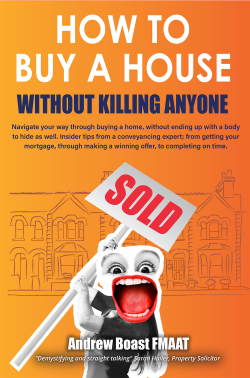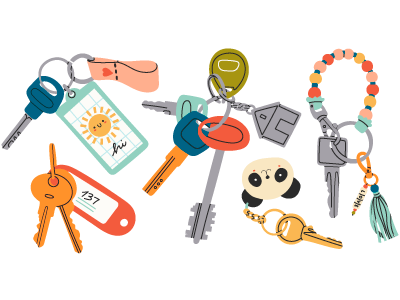Buying a House With a Chain
- A chain is a series of linked property transactions, where each buyer is simultaneously selling their current home to fund their next purchase. This means every part of the chain is reliant on the others to progress smoothly, from offer to completion.
- A property chain connects multiple conveyancing transactions, meaning progress hinges on every link. This interconnectedness can often make the conveyancing process take longer than usual.
- If your house chain is taking too long, identifying the root cause is crucial. Understanding the delay can help you find solutions to speed up your move.
- As a last resort, you might need to break the chain by selling your current home without an onward purchase. If your chain collapses, ensure your legal fees are protected by a No Sale, No Fee policy.
Property chains can vary in length and complexity. They can be as simple as a first-time buyer purchasing from someone moving into a rental, or a lengthy series involving several families all progressing towards their next home.
Regardless of size, the interconnected nature of a chain means that one slow party can create a ripple effect, impacting everyone from top to bottom.
This is why understanding your chain, knowing how many parties are involved, and familiarising yourself with their circumstances (e.g., whether they've found an onward property, if they have complex finances) can be incredibly helpful in managing expectations and potential issues. Worrying about your chain collapsing is natural, but knowledge is your best defence.
How does buying a house in a chain work?
The core conveyancing process remains consistent whether you're in a two-person chain or a ten-person chain. What changes significantly is the timing and sequencing of certain stages, particularly when it comes to financial commitments.
If you're at the bottom or in the middle of a chain, a common strategy is to "mirror the chain." This means you strategically delay ordering costly elements like property searches, the a Homebuyer's Survey, or a mortgage valuation until your buyer (or the buyer's lower down the chain) has done the same, or until your seller has firmly secured their ownward purchase.
The reason for this cautious approach is simple: if the chain isn't fully formed or stable, you could be left waiting indefinitely, or worse, financially out of pocket if a party above you pulls out.
While mirroring is good general advice, always be mindful of practicalities. Check the average turnaround times for property searches with your local authority, for mortgage valuations with your bank, and the availability of RICS surveyors near you.
If these processes take several weeks (e.g., 3-4 weeks), you might need to consider ordering them slightly earlier than the rest of the chain to avoid becoming the cause of delay yourself.
- Fixed, competitive legal fees with no hidden costs.
- Expert conveyancing solicitors with proven local knowledge.
- No Sale, No Fee protection for your transaction. Terms apply.
- On 99% of mortgage lender panels.
- Fast completions.
- We can solve any property challenge.
Is the house chain taking too long?
It's frustrating when your house chain grinds to a halt. Your options are limited, but the most crucial step is to pinpoint the exact cause of the delay and identify which property in the chain it relates to. Common reasons for delays include:
- Legal Title Issues: Problems discovered during property searches or issues with the property's legal deeds.
- Solicitor Delays: An overworked or slow solicitor, or one who is on holiday, can inadvertently hold up the entire chain.
- Valuation Problems: A property being undervalued by a mortgage lender, leading to renegotiations.
- Renegotiations: Buyers and sellers re-negotiating the price after survey results or other issues.
- Change of Heart: A party in the chain simply changing their mind about moving or purchasing.
- Mortgage Offer Issues: Delays in mortgage approvals or offers expiring.
Once you suspect a delay, immediately flag your concerns with your estate agent. Their role is pivotal in communicating with other agents in the chain to ascertain the exact nature of the delay.
This can be more challenging if parties are using online estate agents, as direct communication can sometimes be less fluid.
What happens if the chain can't agree on a completion date?
You should agree on a target date for completion with your chain at the outset, however, you must be flexible as completion dates often move.
Your solicitor will work to get everyone to exchange contracts, at which point the completion date becomes legally binding.
If agreement can't be reached, it could unfortunately lead to a party pulling out, or potentially a 'gazumping' or 'gazundering' scenario if the market is volatile.
How do you break a chain when buying a house?
Breaking a property chain is a last resort for both sellers and buyers, usually triggered by the loss or significant delay of their onward purchase. It involves proceeding with the sale or purchase of your current property without immediately having another one lined up to move into.
Strategies for breaking the chain might include selling your property and moving into temporary rented accommodation, staying with family, or completing the sale and then finding another property to buy at a later date. This option provides certainty on your sale but introduces the stress of finding temporary housing or a new property within a potentially tight timeframe.
What about the second home stamp duty?
If you choose to break the chain, you might temporarily own two properties, which raises questions about Stamp Duty Land Tax (SDLT).
However, Second Home Stamp Duty (the higher rate of SDLT on additional properties) is not payable if you are selling your main residence and buying another main residence, provided you complete the purchase of your new main residence within 36 months of selling your old one.
If you pay the higher rate initially because you've bought a new main residence before selling your old one, you can often claim a refund within the same 36-month period.
It's crucial to consult HMRC's official guidance or a tax professional to understand your specific stamp duty liability. You can also calculate your potential SDLT, including additional rates, using our Stamp Duty Calculator.

How To Buy A House Without Killing Anyone could be the difference in every mover’s dream: buying and moving into your new home stress-free...
OR: stress, missed deadlines, legal disasters, building defects, and possibly the collapse of the whole transaction.
(Costing you a small fortune, a head full of grey hairs, and driving you to threaten the life of your solicitor, lender, co-owners, family, partner, or some combination of all five).
£9.99
Andrew started his career in 2000 working within conveyancing solicitor firms and grew hands-on knowledge of a wide variety of conveyancing challenges and solutions. After helping in excess of 50,000 clients in his career, he uses all this experience within his article writing for SAM, mainstream media and his self published book How to Buy a House Without Killing Anyone.
Caragh is an excellent writer and copy editor of books, news articles and editorials. She has written extensively for SAM for a variety of conveyancing, survey, property law and mortgage-related articles.










